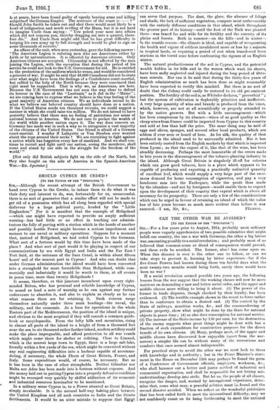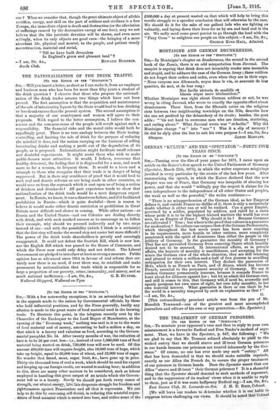CAN THE OTHER WAR BE AVOIDED ?
[TO THE EDITOR OF THE "SPECTATOR.")
Sr,—For a few years prior to August, 1914, probably most ordinary people were vaguely apprehensive of two possible calamities that might befall our country, the one a war with Germany, the other a big labour war, amounting possibly to a social revolution ; and probably most of us believed that common-sense or dread of consequences would prevail, and these evils be avoided. The former, alas ! has come upon us. When this disaster is over is the other one to follow, or can we take steps to prevent it, learning by bitter experience—for if the five Great Powers had known during those ten fateful days what the next twenty-two months would bring forth, surely there would have been no war ?
If a social revolution seemed possible two years ago, the following lessons from the war suggest that the working classes will now be more insistent on demanding a new and better social order, and the upper and middle classes more willing to bring it about. (1) The power of the former in trade disputes, though checked by their loyalty, has been evidenced. (2) The terrible example shown in the resort to force rather than to conference to obtain a desired end. (3) The control by the State of railways, munition works, &c., and the commandeering of private property, show what might be done by the State for national objects in peace time ; (4) as also does conscription for national service. (5) The increase of the State income by 130 per cent. for the destruction of the enemy suggests what great things might be done with but a fraction of such expenditure for constructive purposes for the direct benefit of its own citizens. (6) Many, perhaps most, of the upper and middle classes have discovered how enjoyable (apart from the war- sorrow) a simpler life can be without many of the recreations and comforts that once seemed almost indispensable.
For practical steps to avoid the other war we must look to those with knowledge and in authority ; but in the Primo Minister's state- ment in the House on December 13th may perhaps be found the germ of a Conference of Government officials, employers, workmen, &c., who shall hammer out a better and jester method of industrial and commercial organization, and shall be responsible for not letting mis- understandings develop into strife. But let us, the people of all classes, recognize the danger, and, warned by international experience, deter- mine that, come what may, a peaceful solution must be found and the second disaster avoided. When we reflect on the wonderful patriotism that has been called forth to meet the international difficulty, may we not confidently count on its being forthcoming to meet the national
one ? When we consider that, though the great ultimate object of all this sacrifice, energy, and skill on the part of soldiers and civilians is a free Europe, the immediate object is death and destruction (or the alleviation of sufferings caused by the destructive energy of our foes), may we not believe that the like patriotic devotion will be shown, and even more _willingly, when its only objects are good ones—the bringing of a more abundant life, physical and mental, to the people, and patient steady reconstruction, material and social, " Till we have built Jerusalem In England's green and pleasant land" ?
Beale Club.



































 Previous page
Previous page